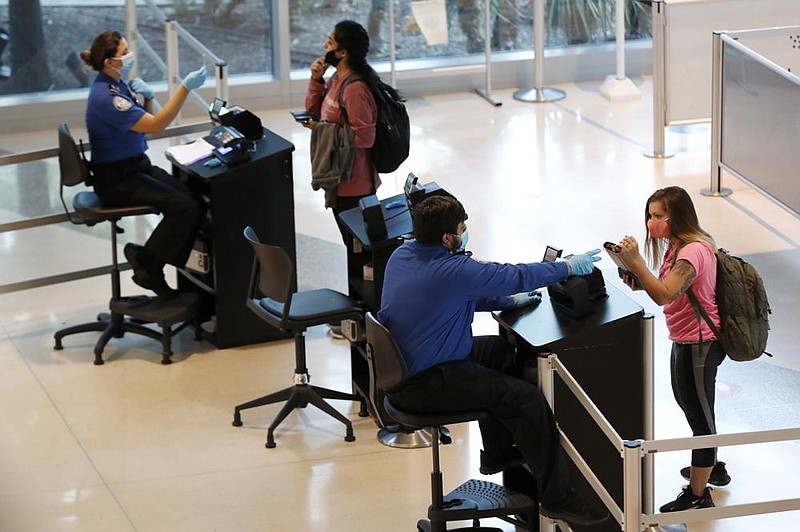The union representing Transportation Security Administration officers is urging the agency's chief to allow its most vulnerable employees to stay home as cases of the novel coronavirus in the agency's ranks climbs rapidly, topping 1,500 this week.
In the early stages of the pandemic, employees in high-risk health groups were allowed to stay home using weather and safety leave, and the agency's regional directors reduced work schedules for everyone else, union leaders say. But in late June, just as the virus began taking hold again, the leave policy was canceled, and officers were ordered back to work, even though air passenger numbers were still down by about 70%.
Since then, virus cases among TSA employees have surged. On July 31, the union wrote to TSA Administrator David Pekoske asking for the previous leave policy to be restored.
"Your decision to implement WSL for high-risk employees correctly recognized that the agency could continue to carry out its mission without having to sacrifice its most vulnerable employees, and this calculus has not changed," union President Hydrick Thomas wrote. "Passenger throughput continues to be a fraction of what it was one year ago, the number of flights per day remains low, and the coronavirus continues to wreak havoc on vulnerable populations."
[CORONAVIRUS: Click here for our complete coverage » arkansasonline.com/coronavirus]
The number of cases among agency employees has been growing rapidly in recent weeks, according to data assembled by The Washington Post using archived versions of the agency's disclosure Web pages. While it's not clear that officers are being exposed at work, the TSA has reported far higher rates of positive tests than either the Defense Department or Veterans Affairs Department, which also regularly disclose when employees have fallen ill.
Lisa Farbstein, a TSA spokeswoman, said the agency changed its policy in anticipation of needing more officers in advance of the July 4 holiday. Having extra officers available to work means that passengers can be moved through checkpoints quickly while still being allowed to spread out, reducing their risk of being exposed to the virus.
But Thomas, who knew the first TSA officer to die of covid-19 and lost a 27-year-old niece to the virus, said the agency has to do more.
"I don't want to go to any funerals," he said in an interview.
On March 15, the agency began reporting figures for employees who had tested positive, disclosing that four at San Jose International Airport in California had fallen ill. In just six weeks, the TSA logged its first 500 cases.
Then, just as they did in the country at large, the number of new cases began to level off, not topping 1,000 until 10 weeks later, on July 9. But since that date, the number of cases has been climbing more quickly, taking just another four weeks to reach 1,500 on Tuesday.
Six agency employees have died of covid-19, the disease caused by the novel coronavirus, as has one contractor.
The agency's officers are required to wear masks, and the TSA has been installing plastic shields for them to work behind. On Wednesday, the TSA announced that it had awarded a $2.5 million contract to California-based Lavi Industries to install the shields at 37 "priority airports" and that the work would be completed by autumn.
But in the letter to Pekoske, Thomas wrote that the extra protective equipment did not do enough to resolve the union's concerns about high-risk employees.
"This pandemic is not permanent, but neither is it going away tomorrow," Thomas wrote. "We believe that prematurely reverting to business-as-usual leave policies by requiring that high-risk employees who choose to prioritize their health and safety exhaust their own leave is myopic: it ignores the sheer scope of this once-in-a-lifetime crisis, it places an unfair burden on many on your front line, and it fails to provide a solution for the near future once the leave balances have been exhausted."
